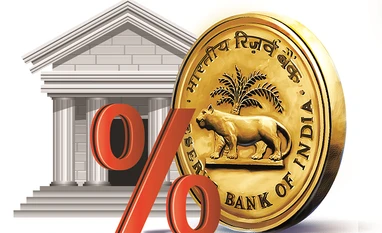The Reserve Bank of India’s (RBI’s) Monetary Policy Committee (MPC) is likely to announce a 25-basis-point (bp) increase in the repo rate on Wednesday, in a bid to bring inflation closer to the central bank’s target of 4 per cent, according to economic experts.
According to the median of a Business Standard poll comprising 10 respondents, the MPC is seen raising the repo rate to 6.50 per cent in the upcoming meeting, taking the benchmark policy rate to its highest level since February 2019. The mode of the poll also suggested a 25-bp rate hike.
The rate-setting panel, according to several experts, is likely to signal a pause in rate hikes going ahead, given that domestic inflation has eased over the past couple of months and is now within the RBI’s tolerance band of 2-6 per cent.
Only two respondents predicted a pause in rate tightening; the others were unanimous on the quantum of the rate hike being 25 bps. Turn to The MPC, so far, has hiked the repo rate by a total of 225 bps in its current tightening cycle, which began in May 2022.
Poll respondents were split over potential changes in the stance of monetary policy, with four institutions expecting a shift to a neutral stance and four predicting that the MPC would retain the current stance of “withdrawal of accommodation”.
Over the past couple of months, a theme that has played out globally is that of central banks opting for less aggressive rate hikes as they seek to achieve their objective of reining in consumer prices without hurting economic growth too much. In December, the MPC hiked the repo rate by 35 bps after three successive tranches of a 50-bp increase.
The US Federal Reserve, too, has significantly cut down the quantum of its rate hikes.
“We are now in a world where a perfect storm is just settling down. As central banks all over the world mull a move towards a pause or continuing hikes, such a move needs to be deftly calibrated depending on country-specific factors. We cannot allow the storm to build up again,” said Soumya Kanti Ghosh, State Bank of India’s group chief economic advisor.
With the rupee having largely stabilised after witnessing considerable volatility from June to October in 2022 and inflation having eased, the MPC has the breathing space to shape its guidance in line with incoming data, analysts said.
“I think the guidance is going to be probably neutral to maybe even mildly dovish. We expect them (the MPC) to reduce their inflation forecast by a reasonable amount -- anywhere by 30-50 basis points -- for the first half of the next fiscal year,” said Rahul Bajoria, managing director and chief India economist, Barclays.
“The urgency to hike rates is declining and that should get reflected in their (MPC’s) projections. The RBI governor did say recently that the currency and inflation crisis is in a way starting to be behind us,” he said.
In December, the MPC projected CPI inflation at 5 per cent in April-June 2023 and that for July-September at 5.4 per cent.
Despite the view of the RBI signalling a pause on rate increases, analysts do not expect the central bank to hint at a softer monetary policy anytime soon. Domestic economic growth may be seen slowing down slightly, but several indicators show resilience in the economy, which suggests that demand in many sectors of the economy is holding up, analysts said.
Moreover, since December 2022, the RBI has placed a special emphasis on the need to bring down sticky and elevated core inflation, which strikes out the volatile components of food and fuel.
Headline CPI inflation declined to a one-year low of 5.72 per cent in December 2022, but core inflation remained above 6 per cent.
)

)

















